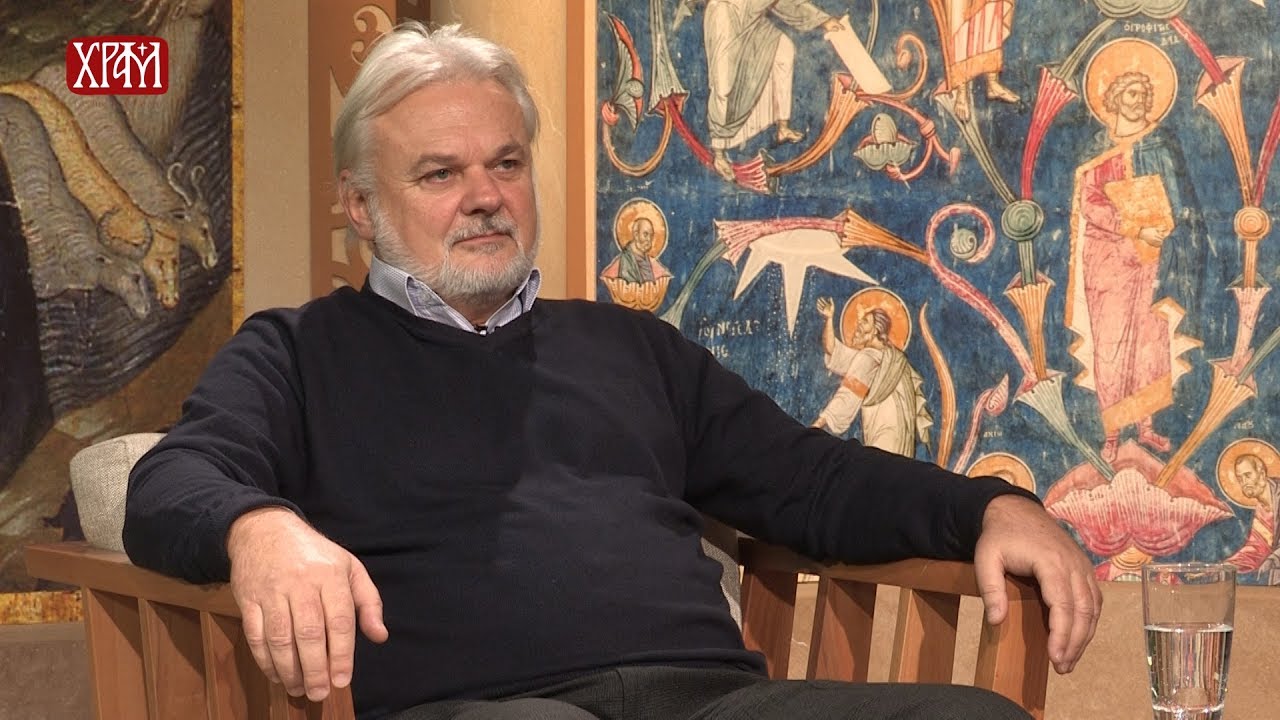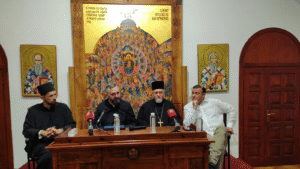The very title of this study already suggests the answer to the question of why the Holy Fathers of our Church regarded upbringing as one of the most important responsibilities—both for those who raise others and for those who are being raised (which, ultimately, includes every one of us). Christian values are either transmitted through the process of upbringing or they are not. Upbringing should not be superficially equated with learning proper behaviour, adopting refined manners, or mastering social roles. These are indeed aspects of upbringing, but they are not its essence.
The essential and foremost aim of upbringing is the formation of the human person. This includes the development of character, a value system, emotional stability, and—no less importantly—a mature and meaningful relationship with God, with others, and with oneself, bearing in mind that the human being is, by nature, a relational being. It is in this context that we must understand the words of St. John Chrysostom, who taught that the aim of upbringing is the cultivation of God-likeness. If we are increasingly realizing the God-likeness in our personal lives or in raising our children, then we may rightly conclude that we are shaping a mature and integrated person, with a fully formed firm character, imbued with a Christian value system, emotionally stable and balanced and engaged in a Christian relationship with God, one’s neighbour, and one’s inner self. In this way, God-likeness encompasses and shapes all that is best in the human person.
Starting from these premises, the question arises: where do we stand today? The situation is, sadly, extremely lamentable. Outside of theoretical theological discussions, God-likeness has all but disappeared as an ideal of upbringing—even within very devout Christian families. People seem no longer to understand the meaning of this idea, let alone the need or imperative to strive towards God-likeness, either in children or adults. The concept remains in the realm of a distant and abstract theological notion. Rather than becoming the cornerstone of education, it is being pushed aside, forgotten, or distorted. It is reduced to the vague ideal of “being a good person,” which then becomes merely socially acceptable behaviour, and in the end, that very notion of socially acceptable behaviour is subjected to all the relativising influences of contemporary (non-)civilisational trends. Thus, God-likeness becomes (or remains) a lofty yet forgotten—and for many, unattainable (or even superfluous?)—ideal.
The meaning of the term God-likeness may become clearer if we compare the words Lord (Gospod) and gentleman (gospodin) in the Serbian language. The word Lord, as we all know refers exclusively to Jesus Christ, the God-Man. Gospodin, by contrast, is a diminutive form meaning “little lord,” and refers to a man who resembles Christ—not in physical appearance, but in spiritual and personal qualities. Dignity, kindness, nobility, warmth, gentleness, respect, moderation, seriousness, responsibility, maturity—these are only some of the characteristics of a gospodin. All of these attributes are possessed by the Lord in their absolute form. The relationship between Lord and gospodin can also be seen in the words of St. Paul the Apostle: “My little children, for whom I labour in birth again until Christ is formed in you” (Galatians 4:19). From these words, it may be concluded that Christian upbringing is, in fact, the process of Christ being formed within us.
One more clarification regarding the term Lord and its derivatives—gospodin and lordship (gospodstvo)—is worth noting. In the hierarchy of angels, the Dominions (or lordships) are described as those who bestow power and wisdom, who teach others how to govern their own will and emotions, and who help human beings subdue their passions. Self-mastery is the defining trait of lordship. To become the master of one’s own will is the lofty aim of spiritual development, and one of the foundational concepts of Orthodox spirituality. As such, it must also be considered a goal of upbringing. Therefore, gospodstvo (lordship) is not a posture, a mannerism, or a performance of refinement, but rather a reflection of deep self-awareness and inner discipline.
In understanding Christian values, everything is, in essence, quite simple—they are clear and concrete because they arise directly from the very person, actions, and teachings of Christ.
What does Christ say in His teaching on the Beatitudes?
“Blessed are the poor in spirit, for theirs is the kingdom of heaven” (Matt. 5:3).
The values derived from this saying are humility, meekness, and simplicity.
“Blessed are the meek, for they shall inherit the earth” (Matt. 5:5).
This closely resembles the previous statement. Here we may add further qualities: meekness, obedience, gentleness.
(The reader should not be confused by the linguistic similarity or seeming analogy of certain terms, which may lead them to conclude that they are being subject to repetition—such as meek and meekness. These refer to two categorically distinct realities: on the one hand, the blessed traits of the person; on the other, the universal values derived from them.)
“Blessed are those who hunger and thirst for righteousness, for they shall be satisfied” (Matt. 5:6).
The values derived from these words are: justice, love of righteousness, love of truth, principled behaviour, and consistency.
“Blessed are the merciful, for they shall obtain mercy” (Matt. 5:7).
The values that follow are: love, compassion, philanthropy, readiness to forgive, and mercy.
“Blessed are the peacemakers, for they shall be called sons of God” (Matt. 5:9).
These words embody values such as: striving for peace, harmony, and order; goodwill; and the avoidance of conflict and aggression.
And what does Christ say about Himself?
“Take My yoke upon you and learn from Me, for I am gentle and lowly in heart, and you will find rest for your souls” (Matt. 11:29).
The Lord directly invites us: “Learn from Me.” He places Himself as the model—realistic, attainable, and accessible.
“For My yoke is easy, and My burden is light” (Matt. 11:30).
Furthermore, the Lord is the embodiment of obedience. The Apostle Paul says of Christ:
“He humbled Himself and became obedient to the point of death, even the death of the cross” (Phil. 2:8).
The Son of God appears as the supreme example of obedience to the Heavenly Father:
“Shall I not drink the cup which My Father has given Me?” (John 18:11).
The entire teaching of the Beatitudes is ultimately condensed in the Person of Christ, for as He taught, so He lived.
He confirmed His teaching through His deeds. His actions testify that, as the God-Man, He was the embodiment of absolute love, truth, justice, mercy, goodness, wisdom, gentleness, and meekness.
He was humble in His “obedience unto death,” ready to forgive, compassionate (“Jesus wept” for Lazarus the Four-Days-Dead – John 11:35), and merciful (cf. the parable of the Good Samaritan – Luke 10).
But when necessary, He was also just and righteous in His wrath (“And He made a whip of cords, and drove them all out of the temple, with the sheep and the oxen, and poured out the changers’ money and overturned the tables” – John 2:15), as well as direct and sharp in speech (“But He turned and said to Peter, ‘Get behind Me, Satan! You are an offence to Me, for you are not mindful of the things of God, but the things of men.’” – Matt. 16:23).
The foregoing discussion clearly shows that Christian values do not originate from any ideological construct, nor are they merely products of socio-historical conditions. Rather, they possess both a metaphysical (timeless) and concrete dimension, embodied in the Divine-Human Person of the Lord Jesus Christ, as well as in the many deified saints: “God is wondrous in His saints” (Ps. 68:35). For this reason, Christian values cannot be dismissed, questioned, or relativised—they are the cornerstone upon which all genuine values rest.
At the same time, we can observe an emerging trend or even a deliberate agenda aimed at discrediting, rejecting, or ignoring the Christian value system. The greatest danger arises when this occurs “under the radar”—insidiously and imperceptibly. When such efforts are accompanied by (pseudo-)scientific reasoning intended to lend intellectual weight, the situation becomes all the more serious. And it grows even more serious when these efforts are directed toward the field of early childhood education.
Specifically, this involves the use of psychology and pedagogy to construct new paradigms of upbringing, which are then disseminated through so-called “parenting schools.” One such paradigm asserts that “an obedient child is an unhappy child.” The reasoning behind this claim is that parental authority, strictness, and repressive measures hinder the satisfaction of the child’s needs and its free personal development. The consequence, it is said, is anxiety and neurotic symptoms. On the surface, there is little to dispute here. It is indeed true that some children raised in authoritarian environments do exhibit signs of neurotic or maladaptive behaviour.
The problem, however, arises when universal conclusions are drawn from such cases—namely, that obedience is, eo ipso, undesirable and obsolete, and that respect for authority and the setting of boundaries are dangerous and outdated educational practices. It is precisely this shift to the opposite extreme that takes place “under the radar.” (These consequences may not even be recognised by some proponents of such paradigms.) What is at stake here is a fundamental shift in the value code. Obedience—one of the greatest Christian virtues—is now seen, in their view, as a path to neurosis, rebellion, and dysfunctional behaviour. Thus, obedience becomes a highly suspect value that ought to be discarded—so the advocates of this new educational agenda would argue. From a formal-logical standpoint, if “an obedient child is an unhappy child,” then it follows that “a disobedient child is a happy child.” This is, at the very least, the implicit message.
A second paradigm within these new educational approaches asserts that shame and contrition are outdated psychological constructs. According to this view, such feelings are primarily the result of culturally imposed repressive patriarchal or “Balkan” norms, and they represent psychological burdens (forms of “internalised repression”) that may lead to anxiety or neurotic behaviour. Here again we see a clever manipulation: universal conclusions are drawn from isolated examples. From one extreme, the argument swings entirely to the other. If shame and contrition have led to neurotic outcomes in some individuals, then—so the argument goes—they must be rejected in their entirety as potentially harmful to personality development. In this way, “the baby is thrown out with the bathwater,” as the proverb says.
From the Christian perspective, shame and contrition are expressions of the fear of God, without which no virtuous or spiritual life is possible: “The fear of the Lord is the beginning of wisdom” (Ps. 111:10). The fear of God serves a corrective purpose; it guards us from sin, engenders caution and watchfulness, and sharpens our moral awareness. To reject the fear of God, along with shame and contrition, is to sever the individual (or child) from God and extinguish the emotional and moral bond between the human being and the Creator. There is reason to suspect that this is, in fact, the ultimate aim of these new pedagogical paradigms. When this is combined with the denial and relativisation of authority, the elimination of prohibitions and boundaries, and the acceptance of the child’s will as the measure of personal growth, it becomes evident that we are dealing with an entirely new model of upbringing—one whose long-term consequences may be profoundly damaging and difficult to foresee.
How else are we to interpret the prophetic words of the Apostle Paul regarding the character of people in the last days?
“But know this, that in the last days perilous times will come: for men will be lovers of themselves, lovers of money, boasters, proud, blasphemers, disobedient to parents, unthankful, unholy, unloving, unforgiving, slanderers, without self-control, brutal, despisers of good, traitors, headstrong, haughty, lovers of pleasure rather than lovers of God, having a form of godliness but denying its power” (2 Tim. 3:1–5).
Such character traits will not arise overnight. All these qualities will be preceded by defective forms of upbringing. If obedience, the fear of God, shame, humility, respect for authority, and the setting of boundaries are removed, the very personalities described by the Apostle will gradually emerge. This is a transgenerational process steadily moving toward its goal.
A shift in the content and method of upbringing presents a serious risk of producing a new value system and highly questionable, even maladaptive, personality types. For this reason, upbringing must remain at the forefront of critical attention and continuous evaluation. In its essence, upbringing is either an affirmation or a negation of Christian values.
+ + +
To conclude, let us consider a real-life example.
In a city bus, a young man sat in front of a woman accompanied by her son, who appeared to be around four or five years old. The boy was continually pushing and kicking the young man’s seat with his feet. The man politely turned around and asked the woman to correct her son. She merely gave him a blank stare. The boy continued to kick the seat. The young man repeated his request, at which point the mother replied that she never forbids her child anything—that, she explained, was her “parenting principle.” The boy kept on “playing.”
Before getting off the bus, the young man stood up, took his chewing gum out of his mouth, and stuck it into the woman’s hair. Outraged, she exclaimed: “Are you out of your mind? What are you doing?”
The young man calmly replied:
“My parents raised me the same way you’re raising your son. They never forbade me anything.”





